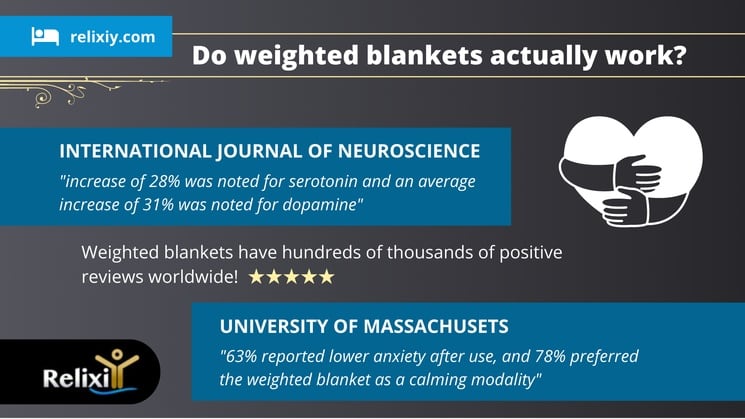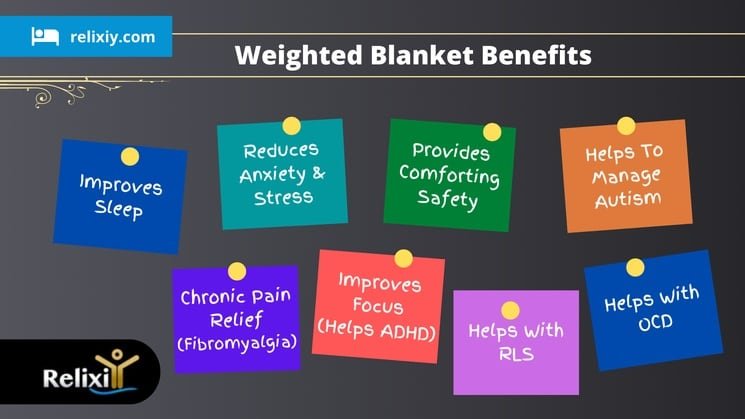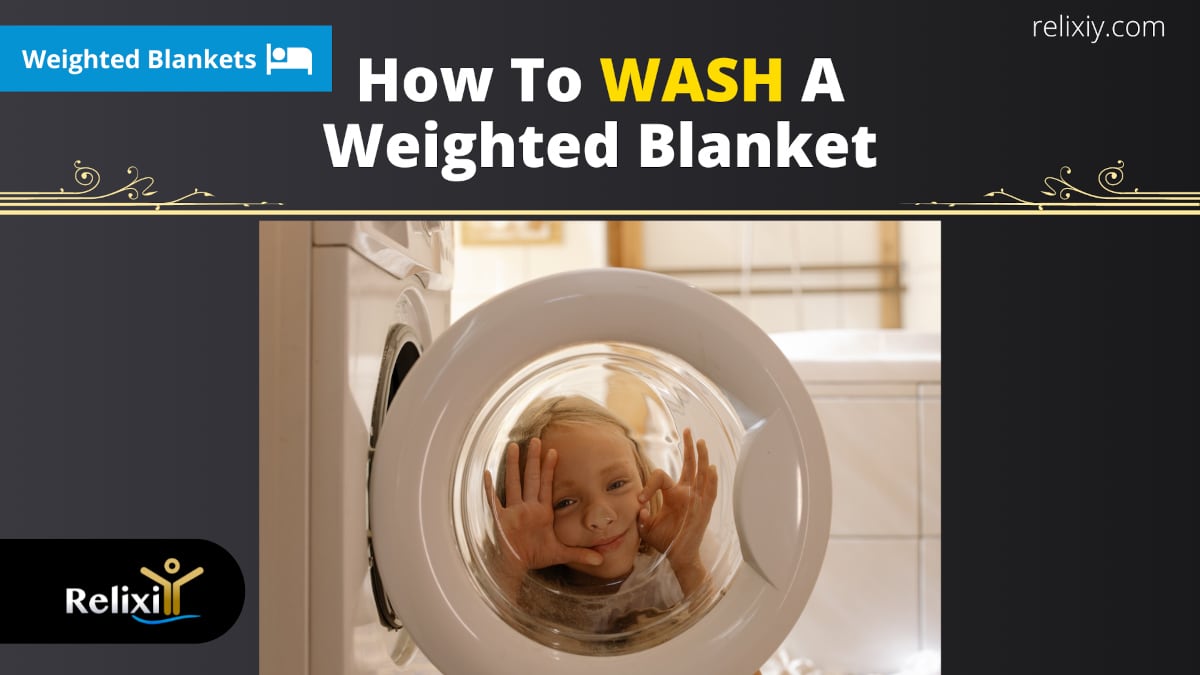Weighted blankets are among the most popular products to improve sleep. Sleeping with a weighted blanket can have unique therapeutical benefits coupled with the feeling of deep relaxation. This sets them apart compared to traditional blankets.
How Do Weighted Blankets Work?

Weighted blankets use deep touch pressure stimulation to naturally stimulate the production of the hormone of happiness (serotonin), increase the hormone regulating sleep (melatonin), and reduce the stress hormone (cortisol). This helps to improve sleep, reduce stress and anxiety, and provide an overall feeling of safety and relaxation.
A weighted blanket combines the soothing effect of an ordinary blanket with the therapeutic effect of deep touch pressure (DTP) to provide a calming effect.
When used, the weighted blanket exerts gentle pressure on the body, naturally stimulating the brain to release serotonin and dopamine. Those two important neurotransmitters are responsible for making people feel happy and relaxed.
Moreover, serotonin is naturally converted into melatonin, which regulates sleep.
The calming effect of the weighted blankets is similar to that of a firm hug, swaddling, or even massage. This is why those blankets are often referred to as the hug blankets. It’s because of the pleasant feeling they give!
Do weighted blankets actually work?
Initial scientific research provides encouraging evidence about the benefits of weighted blankets. Large-scale studies are still missing, so the research is still considered incomplete by scientists. However, millions of people are already using weighted blankets, and they published hundreds of thousands of positive reviews all over the world.

What Is the Science Behind Weighted Blankets?
Weighted blankets work by creating a gentle, but firm and consistent compression that provides a deep pressure stimulation. This gives the same feeling experienced during massages, or when receiving a hug.
The deep touch pressure (DTP) exerted by a weighted blanket activates the parasympathetic nervous system (PSNS), which, among other things, regulates the sleep cycle.
Studies have shown that weighted blankets can be effective in improving sleep and reducing anxiety. For example:
- UNIVERSITY OF MASSACHUSETTS in a 2014 study: “63% reported lower anxiety after use, and 78% preferred the weighted blanket as a calming modality”. This after using a 30-pound weighted blanket for just 5 minutes.
- INTERNATIONAL JOURNAL OF NEUROSCIENCE in a study about the effects of massage therapy reported an “increase of 28% was noted for serotonin and an average increase of 31% was noted for dopamine”. Weighted blankets rely on the same deep pressure stimulation principle used by massage therapy.
Those are just 2 of the many scientific studies demonstrating the effects of deep pressure stimulation.
While the research is extremely promising, the scientific community believes that it is still too early to reach any final scientific conclusions. This is because the currently available studies are still in the initial phase, and for this reason, they generally involve only small groups of volunteers or patients.
However, while it is true that there is no large-scale scientific research available on weighted blankets, it is also true that millions of people are already experiencing and feeling the benefits of using them. This is reflected by a large number of enthusiast reviews available online about weighted blankets.
Weighted Blanket Therapy: When was it used by doctors?
For many years doctors used weighted blankets to treat patients (both adults and children) with special needs such as autism, severe anxiety, OCD, as well as post-traumatic stress disorder (PTSD).
They discovered that such patients were easily relieved with the weights of these blankets as a result of the deep pressure stimulation they experienced.
Weighted blankets were initially manufactured and used only for therapeutic purposes, however, now they are available for everyone to enjoy!
what is a weighted blanket?

A weighted blanket is a heavy blanket used for its therapeutic effects. Those heavy-weight blankets usually weigh between 5 and 12kg.
Like a hug, those special heavy blankets have a calming effect, helping to relax, reduce anxiety, and enhance sleep.
Premium weighted blankets like Relixiy® come with a removable luxury cover with a different texture on the 2 sides to enhance the sensory experience. This also helps relaxation, improves comfort, and makes keeping the weighted blanket clean easier.
What are the Benefits of Sleeping With a Weighted Blanket?

A weighted blanket can often provide game-changing benefits already after its first use. However, in some cases, you will gradually start feeling better within 1-2 weeks of sleeping with it.
Here are the most popular weighted blanket benefits:
- Improve Sleep And Insomnia – Sleeping with weighted blankets helps promote the secretion of serotonin and melatonin. That’s why heavy blankets can help people suffering from insomnia and other sleep disorders to relax, and get more uninterrupted sleep as well as more deep sleep.
- Reduce Stress And Anxiety – Weighted anti-anxiety blankets help reduce the levels of cortisol (stress hormone), promoting relaxation and melting away stress and anxiety.
- Fibromyalgia Pain Relief – Weighted blankets for fibromyalgia can help manage the chronic pain caused by fibro. This is thanks to the soothing effect of deep pressure stimulation. Moreover, having better sleep also helps to improve the quality of life for people affected by fibromyalgia insomnia. There are some key elements to look for when choosing the best weighted blanket for fibromyalgia and getting the right weighted duvet for you.
- Helps To Manage Autism – Weighted blankets for autism also known in the autism community as sensory blankets can help to manage this condition. just like a hug and mild touch would help an autistic patient relax and even sleep better, a weighted blanket provides the same benefits.
- Helps With RLS – Weighted blankets can help with restless leg syndrome, because they improve sleep and reduce stress. RLS can be improved by having healthy fundamentals like proper sleep and low levels of stress.
- Improve Focus / Attention – Weighted blankets for ADHD (Attention-Deficit / Hyperactivity Disorder) are especially beneficial for people affected by this condition. Because by promoting calmness, they can help to keep adequate levels of focus and attention.
- Provide Comforting Safety – Weighted blankets for PTSD (Post-Traumatic Stress Disorder) can give a feeling of safety and can be very comforting by mimicking a hug. Helps to keep calm, relieve stress, and help to cope with the psychological crisis that may follow traumatic events.
- Helps With OCD – Weighted blankets can help relieve obsessive compulsive disorders (OCD). This is thanks to their calming effect, which helps to melt away intrusive thoughts.
how heavy should a weighted blanket be?
Weighted blanket weight recommendations are ranging between 7 and 12% of the user’s body weight. With the preference of most people being around 10% of their body weight.
While it is true that most people prefer having a weighted blanket of approximately 10% of their body weight, this doesn’t work well for everybody. This is because when choosing a weighted blanket weight it’s important to first understand what your body likes more.
For example, ask yourself those questions:
- Do you enjoy compression? Things like strong hugs or a very thick blanket.
- If yes: choose a weighted blanket that is slightly heavier than 10% of your body weight.
- If you don’t enjoy compression: you should choose a weighted blanket that is lighter than 10% of your body weight.
- Are you strong or weak? If you have any physical issues, it may be difficult for you to move the heavy blanket around. In this case, you should prefer something lighter than 10% of your body weight. It is also important to keep in mind that you must be able to remove the weighted blanket from your body at any time without any help.
That’s why at Relixiy® we recommend choosing a weighted blanket that is between 7 and 12% of your body weight. This recommendation is based on data and direct feedback we received from our customers regarding how their weighted blanket weight feels.
You can use the handy Relixiy® weighted blanket weight calculator below to check what’s the ideal blanket weight for you:
Weighted Blanket Weight Calculator for Adults & Child
Weighted Blanket Weight Table
As general guidance, you can use the table below to have a quick look at the right weighted blanket weight for you. However, to get a more accurate recommendation, I suggest using the calculator available in the previous section.
| Body Weight Range | Weighted Blanket Weight Range |
|---|---|
| 18-27 kg – (41-60 lbs.) | 1.8-2.7 kg – (4-6 lbs.) |
| 27-36 kg – (61-80 lbs.) | 2.7-3.6 kg – (6-8 lbs.) |
| 36-45 kg – (81-100 lbs.) | 3.6-4.5 kg – (10-12 lbs.) |
| 45-55 kg – (101-120 lbs.) | 4.5-5.5 kg – (12-14 lbs.) |
| 55-73 kg – (121-160 lbs.) | 5.5-7.3 kg – (12-16 lbs.) |
| 73-90 kg – (161-200 lbs.) | 7.3-9 kg – (16-20 lbs.) |
| 90-113 kg – (201-250 lbs.) | 9-11 kg – (20-25 lbs.) |
| 113-145 kg – (251-320 lbs.) | 11-14 kg – (25-32 lbs.) |
| 145-172 kg – (321-380 lbs.) | 14-17 kg – (32-38 lbs.) |
Who should not use a weighted blanket?
Weighted blankets are safe for most people and can provide comfort, relaxation, and many other benefits. However, they can also pose a potential health risk for people affected by specific conditions.
This is especially true for people with those conditions, for which we recommend you to consult your doctor before using a weighted blanket:
- Respiratory disorders, especially if during sleep
- Low blood pressure
- Type 2 diabetes
A weighted blanket may not be suited for especially weak people, because they may not be able to get out of the heavy blanket by themselves.
People under 10 years old should not use a weighted blanket for adults and teenagers. Moreover, when considering a weighted blanket for kids, it is advised to check with a healthcare professional before the child starts using one.
Finally, people that aren’t confident about their health should consult a GP before purchasing a weighted blanket.






